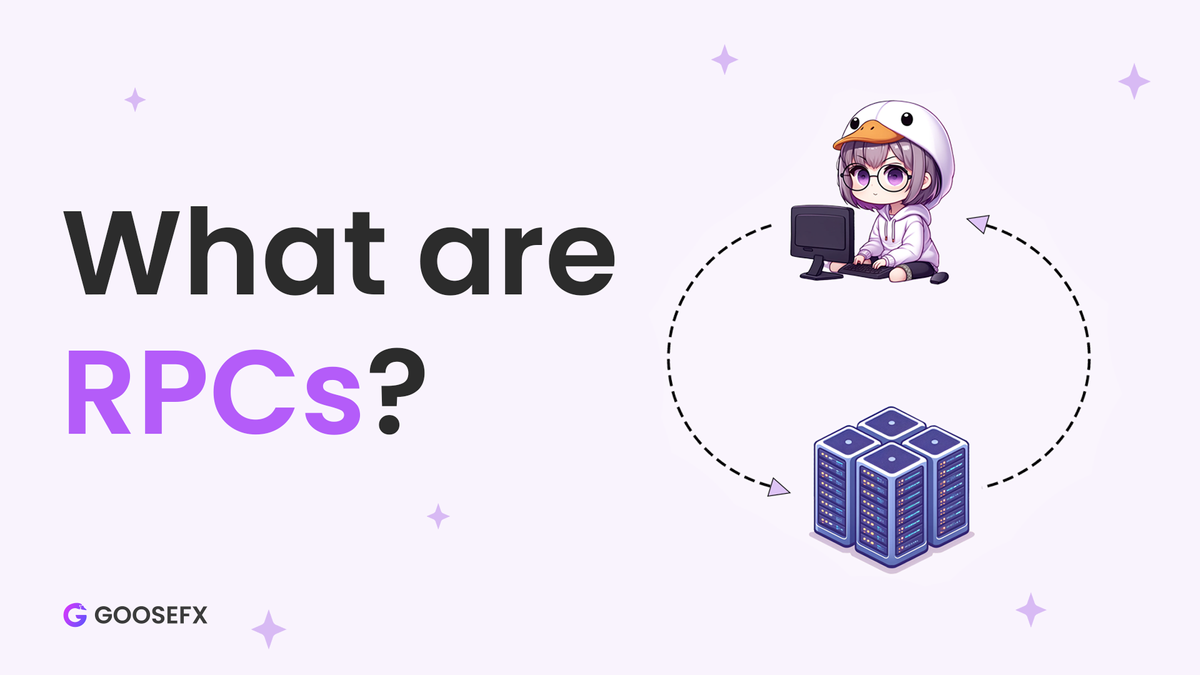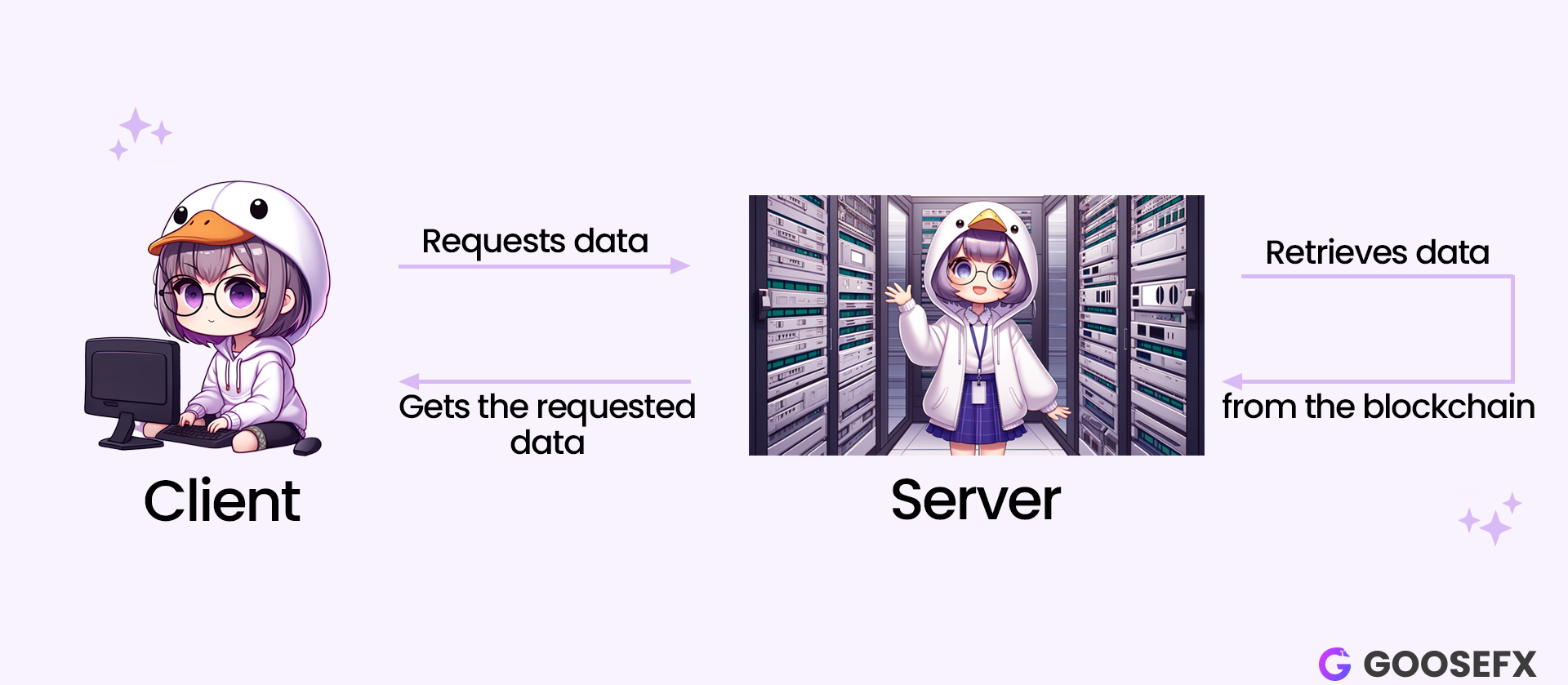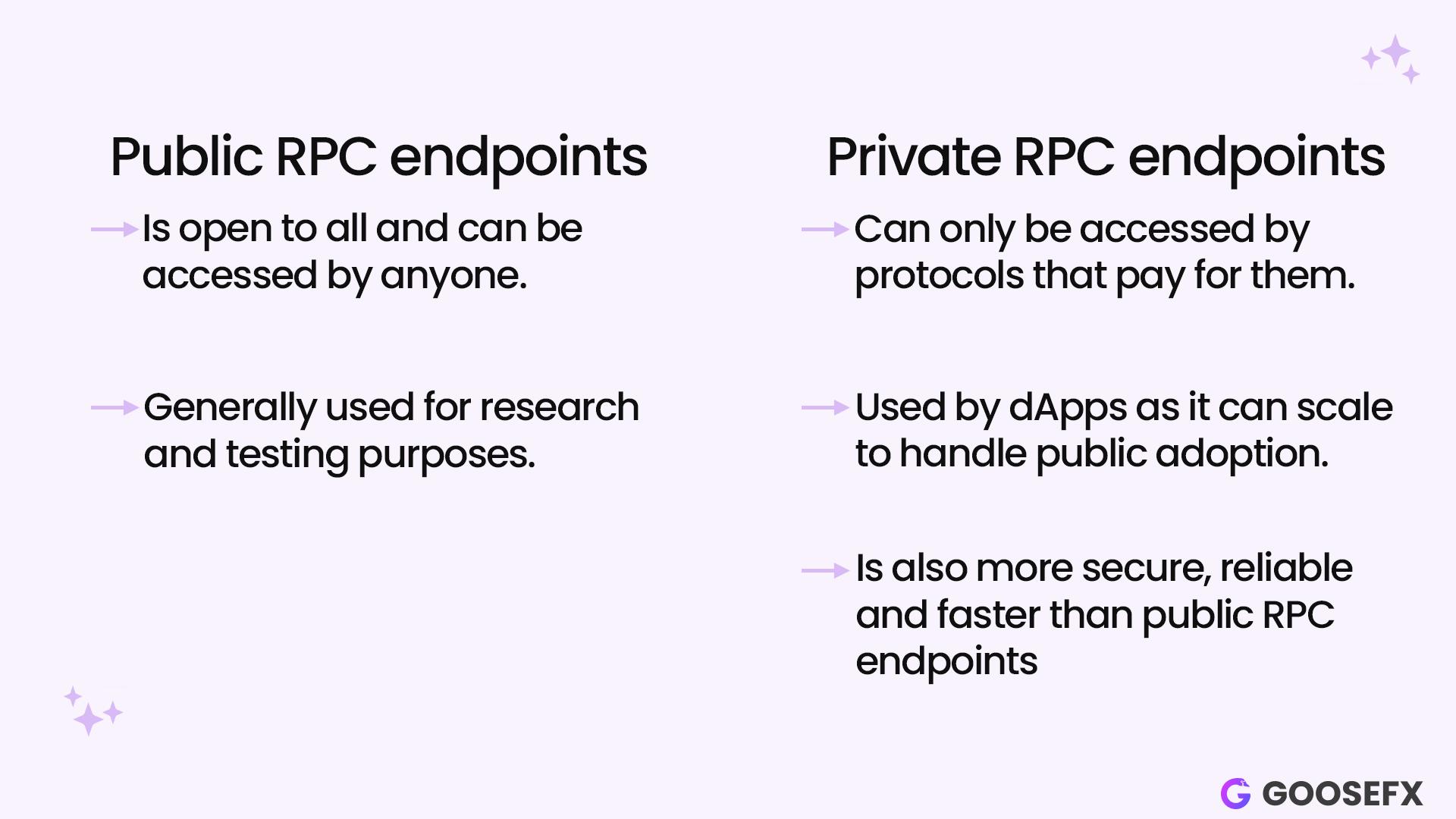Solana RPCs - What are they?
Learn what RPCs are, how they power your favorite dApps and the top RPC providers on Solana with GooseFX!

Introduction
You might have seen the term "RPC" thrown around on twitter quite a lot whether it is during times of network congestion with random RPC errors being thrown on dApps or a few famous people such as Mert talking about them.
you can now 1-click deploy any type of Solana RPC node (including geyser) — in any region around the world
— mert | helius.dev (@0xMert_) March 28, 2024
Jito, gRPC, varying node requirements — and many more node types, mods, and plugins coming soon
nothing lets you experience solana speeds like dedicated infra https://t.co/bj1HcINXpa
RPCs are critical to any blockchain which act as a bridge between a user and the blockchain. Any dApps constantly requires data from the chain to be retrieved to complete user interactions whether that's depositing, lending, trading, retrieving block data and more.
This, is where RPCs and RPC nodes come in to play. So, what's the big deal with about all of this anyway? Stick around, and we'll break it down for you.
What are RPCs?
RPC stands for Remote Procedure Call. It is a communication protocol that provide a way for dApps to communicate with the chain by utilising different functions and systems. Pretty big words I know but in simple language, think of RPC as a middleman between any chain and the client i.e dApps. This happens via something we know as RPC Nodes. A node is simply a computer that talks with other nodes or computers to agree on new information like a transaction or block state etc.
Did you know that on Solana, we have RPC nodes that handle data calls from dApps and Validator nodes that participate in consensus
You might have also heard of the term RPC endpoint. These endpoints are basically those locations where a program sends its RPC requests so that it can access the chain's data. It's the gateway for a dApp to interact with blockchain data in real-time.
How do they work?
Well on the forefront things might look pretty simple to you. However, functioning behind the curtain is a bunch of complex stuff happening. RPC nodes receive requests then handle them and send the outcome of that request back to the application. During this process, the node interacts with the chain to execute the requested action.
For example, let's say there's a dApp known as FooseFX. FooseFX requests the current wallet balance for a user from the RPC node by providing the wallet address. The RPC node retrieves the balance from Solana network and sends it back to the dApp, enabling real-time display without direct blockchain access.
To utilize an RPC node, FooseFX is coded in such a way that it can utilize its supported RPC calls, such as fetching transaction details, sending new transactions, and checking the blockchain's status.

There are two sides of any RPC request:
- Client - It is that component of this process that initiates the RPC call to retrieve information from the chain. In our example above, FooseFX is the client.
- Server - The server component is the one receiving that request and sending the information as an outcome to the client. Helius is a well known example of a RPC provider i.e being the server.
Benefits of RPCs
As is evident, any RPC is vital to a chain's ecosystem without which the dApps wouldn't be able to thrive. While there does exist other ways such as Webhooks and custom APIs to retrieve information on-chain, most protocols utilize RPC nodes as it makes it easier. RPC nodes simplify things for both developers and users of dApps.
Apart from this crucial benefit, there are two types of RPC endpoints which are public and private RPC endpoints each with their own set of benefits. Let's take a look at each of them!
Public RPC endpoints
As the name suggests, public RPCs can be utilized by everyone without any cost. Anyone and everyone can integrate these public endpoints in their dApps. They are generally created by the blockchain teams themselves to allow developers build protocols on it.
Solana has its own public RPC that can be found on their documentation page.

Generally, public RPC endpoints are used for research, testing and educational purposes and aren't built for commercial use as they can't scale for public adoption and are relatively slower. This is where Private RPC endpoints come into play!
Private RPC endpoints
As opposed to public RPC endpoints, private endpoints are only accessible to protocols that pay for them or own them. They are also much more secure and reliable than public RPC endpoints making them a go-to choice for most dApps as they can handle massive public adoption.
The manager of the private RPC endpoint such as Helius, is responsible for keeping it operational at all times and scale it further. So, what other benefits does private RPC endpoints provide?
- Speed - Public endpoints have limited resources, which means they can't deliver the response speed modern applications demand. This is why private endpoints are faster which is why dApps utilize them.
- Scalability - Private infrastructure offers the advantage of requesting additional throughput when needed. You can even opt for premium infrastructure, a customized solution designed specifically to meet your requirements.
- Flexibility - Public RPC endpoints lack support teams to adapt their APIs for different use cases. With private RPC endpoints, you can customize the code's functionality to meet specific needs that your dApp requires while keeping the data secure and reliable.

Top Solana RPC providers
Well, after discussing a tonne of benefits of private RPC endpoints, one might wonder which RPC provider should they use?
Before we get on to that, a few things to keep in mind when choosing your RPC provider on Solana. Prioritize reliability, speed, and cost-effectiveness of any RPC provider. Look for providers with reliable uptime, minimal latency, transparent pricing, and flexible options to scale with your application's needs. Ensure they prioritize security to protect your data and transactions.
With that being said, let's take a look at a few go-to Solana RPC providers:
- Helius is a Solana exclusive RPC provider and is the leading RPC and API platform. It provides a full suite of development tools including RPC endpoints.
- Quicknode is your go-to RPC provider offering swift and dependable access to 24 networks, spanning Ethereum, BNB Chain, Arbitrum, Optimism, Polygon, Aptos, Avalanche, Fantom, zkSync Era, Solana, and beyond.
- Alchemy is another multichain RPC provider offering node services and other development tools for people to get started with. It is also one of the most popular RPC provider currently.
Ending Thoughts
With that, we come to the end of our blog. By now you must have a robust understanding of what RPCs are, how RPC nodes work and which private RPC nodes you can get started with if you're building your own protocol on Solana.
As you code away on your projects, keep those RPCs in mind and don't hesitate to tap into those private RPC nodes for some smooth sailing on Solana.
Happy coding! Intern out.
Stay Tuned with #GooseAcademy
Website | Twitter | Telegram | Discord | Docs
Disclaimer: The statements, proposals, and details above are informational only, and subject to change. We are in early-stage development and may need to change dates, details, or the project as a whole based on the protocol, team, legal or regulatory needs, or due to developments of Solana/Serum. Nothing above should be construed as financial, legal, or investment advice.

Comments ()